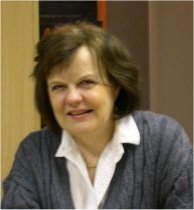Interview with Marja Järvelä:
FSD holdings - a quick way to interpretation
Diversity is the main attraction of the research programme on Social Capital and Networks of Trust.
Helena Laaksonen 9.5.2003
Marja Järvelä, vice president of the Research Council for Culture and Society at the Academy of Finland, encourages people who are planning research projects to use archived data whenever possible and scientifically justifiable. This way the researcher can minimise the costs and effort required by data collection.
 - I find this a good argument, as is points out that researchers can go straight to interpretation instead of planning all the stages from the beginning, Järvelä says.
- Even my own research experience has shown me that research projects are too eager to collect new surveys. The existing ones are not used intensively enough.
- I find this a good argument, as is points out that researchers can go straight to interpretation instead of planning all the stages from the beginning, Järvelä says.
- Even my own research experience has shown me that research projects are too eager to collect new surveys. The existing ones are not used intensively enough.
May 2003 round for applications
The Academy of Finland's May 2003 round for applications closed on 15 May. The academy invited plans of intent for, among others, the programme on Social Capital and Networks of Trust. Six million euros have been allocated to the programme and the Research Council for Health participates in its planning and administration. Järvelä points out that nothing prevents projects from using already archived and previously collected qualitative or quantitative data.
Comparative data and images of contemporary life
Järvelä laments that few international comparative surveys have been carried out in Finland recently. She expects the programme on social capital to produce both comparative studies of two or three countries and qualitative studies, the data of which could then be archived. On the other hand, archive holdings have some data that projects could use to make international comparisons. She also hopes that the research programme will produce portrayals of contemporary life and society.
Multidisciplinary projects
The programme on social capital aims at multidisciplinary research and co-operation between disciplines represented by the two councils. Järvelä feels confident that the wide-ranging program will attract competent applicants and will allow recruiting researchers from many different disciplines.
In addition to culture researchers and social scientists she expects applications from historians and linguists. Järvelä thinks that the possibilities for consortium projects look promising for sociologists and economists, for example.
She notes, however, that international evaluation often emphasizes traditional disciplines and demands the same comprehensiveness of applications of multidisciplinary research. For cross-discipline, experimental research this may be a problem, since it is difficult to describe research methods when no such methods have been established as yet.
Co-operation with researchers
The theme of social capital was initiated by researchers and developed in co-operation with them, which pleases Marja Järvelä.
- In European scientific community I often have to stress the fact that an organisation like the Academy of Finland can produce programs which are not top-down, originating from the administration.
Projects selected from the May 2003 round to the second phase of applications shall submit their full applications by 15 September 2003. Full applications will be submitted to international evaluation. Research groups will have to convince the evaluators of the usefulness of their project. Mere social criticism will not be enough because European evaluation often asks whether the research project will help in solving some problem.
More information:
May 15 application round
http://www.aka.fi/index.asp?id=6592E75D911E4D809C40D7A710131957
Research Programme on Social Capital and Networks of Trust
Top of page | Privacy Policy
|